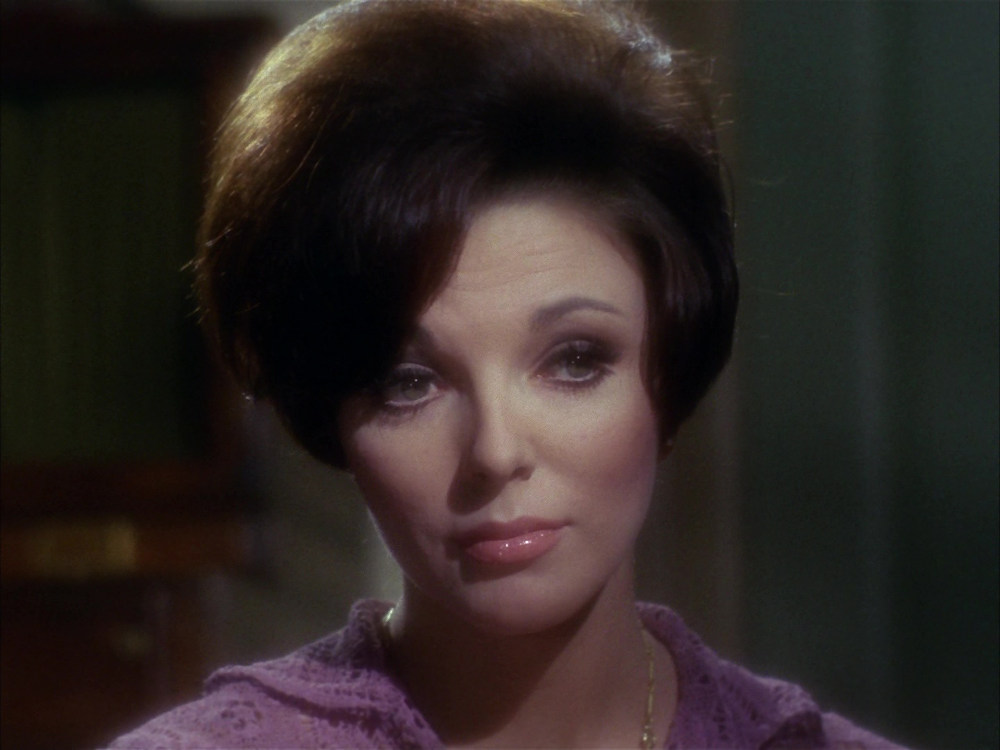Difference between revisions of "Edith Keeler (OS28)"
From Trekipedia
m (Admin moved page Keeler, Edith (OS28) to Edith Keeler (OS28)) |
m |
||
| Line 1: | Line 1: | ||
{{MyriadKeelerEdith}} | {{MyriadKeelerEdith}} | ||
| − | {{ImageInfoBox2|name=Edith Keeler|file=keeler_edith-tos28.jpg|caption=Edith Keeler ( | + | {{ImageInfoBox2|name=Edith Keeler|file=keeler_edith-tos28.jpg|caption=Edith Keeler ({{TOS28}})}} |
{{TableRow|title=Species|data=[[Humans|Human]]}} | {{TableRow|title=Species|data=[[Humans|Human]]}} | ||
{{TableRow|title=Sex|data=Female}} | {{TableRow|title=Sex|data=Female}} | ||
| − | {{TableRow|title=First Appearance|data= | + | {{TableRow|title=First Appearance|data={{TOS28}} ([[1967 (Production)#APR06|6 Apr 1967]])}} |
{{TableRow|title=Portrayed by|data=[[Collins, Joan|Joan Collins]]}} | {{TableRow|title=Portrayed by|data=[[Collins, Joan|Joan Collins]]}} | ||
| − | {{TableRow|title=Advertising|data={{ | + | {{TableRow|title=Advertising|data={{AmazonTOSBD}} }} |
|}</div> | |}</div> | ||
Edith Keeler ran the [[21st Street Mission]], a [[soup]] kitchen, in [[New York City]] during the [[Great Depression]]. She often spoke of a better future, in which [[Humans]] had harnessed [[nuclear power]], built spacecraft to explore the [[Milky Way galaxy|galaxy]], and solved the problems of hunger and poverty on [[Earth]]. When [[Dr.]] [[McCoy, Leonard|Leonard McCoy]] [[time travel|traveled back in time]] to [[1930]], he prevented her death from a traffic accident. Keeler soon founded a pacifist movement in response to the rise of [[fascism]] in [[Europe]]. On 23 February 1936, Keeler met with [[United States President]] [[Roosevelt, Franklin D. (OS28)|Franklin D. Roosevelt]]. Her movement's influence delayed the entry of the [[United States of America]] into the [[World War II|Second World War]], allowing the [[Nazis]] time to develop [[nuclear weapons]] that ensured their victory.<ref name="TOS28"/> | Edith Keeler ran the [[21st Street Mission]], a [[soup]] kitchen, in [[New York City]] during the [[Great Depression]]. She often spoke of a better future, in which [[Humans]] had harnessed [[nuclear power]], built spacecraft to explore the [[Milky Way galaxy|galaxy]], and solved the problems of hunger and poverty on [[Earth]]. When [[Dr.]] [[McCoy, Leonard|Leonard McCoy]] [[time travel|traveled back in time]] to [[1930]], he prevented her death from a traffic accident. Keeler soon founded a pacifist movement in response to the rise of [[fascism]] in [[Europe]]. On 23 February 1936, Keeler met with [[United States President]] [[Roosevelt, Franklin D. (OS28)|Franklin D. Roosevelt]]. Her movement's influence delayed the entry of the [[United States of America]] into the [[World War II|Second World War]], allowing the [[Nazis]] time to develop [[nuclear weapons]] that ensured their victory.<ref name="TOS28"/> | ||
| Line 12: | Line 12: | ||
<ref name="TOS28">{{RefTOS28}}</ref> | <ref name="TOS28">{{RefTOS28}}</ref> | ||
</references> | </references> | ||
| + | {{DEFAULTSORT:Keeler, Edith (OS28)}} | ||
[[Category:Library]] | [[Category:Library]] | ||
[[Category:People]] | [[Category:People]] | ||
Revision as of 16:11, 18 February 2023
Myriad Universes: Edith Keeler
Edith Keeler
| Species | Human |
| Sex | Female |
| First Appearance | TOS28 (6 Apr 1967) |
| Portrayed by | Joan Collins |
| Advertising |
Edith Keeler ran the 21st Street Mission, a soup kitchen, in New York City during the Great Depression. She often spoke of a better future, in which Humans had harnessed nuclear power, built spacecraft to explore the galaxy, and solved the problems of hunger and poverty on Earth. When Dr. Leonard McCoy traveled back in time to 1930, he prevented her death from a traffic accident. Keeler soon founded a pacifist movement in response to the rise of fascism in Europe. On 23 February 1936, Keeler met with United States President Franklin D. Roosevelt. Her movement's influence delayed the entry of the United States of America into the Second World War, allowing the Nazis time to develop nuclear weapons that ensured their victory.[1]
Notes and References
- ↑ Roddenberry, Gene (Executive Producer). "The City on the Edge of Forever." Star Trek, Season 1, Episode 28 (Production 28). Directed by Joseph Pevney. Written by Harlan Ellison. Desilu Productions, 6 April 1967.

